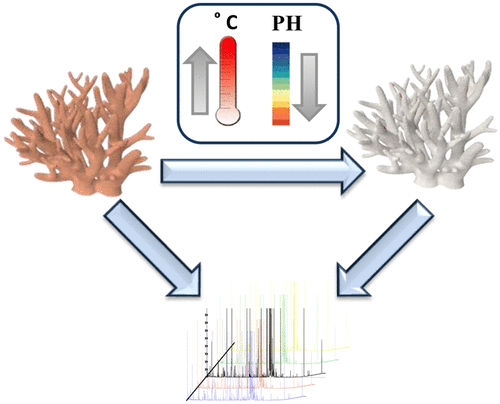当前位置:
X-MOL 学术
›
J. Proteome Res.
›
论文详情
Our official English website, www.x-mol.net, welcomes your feedback! (Note: you will need to create a separate account there.)
Comparative Metabolomics Approach Detects Stress-Specific Responses during Coral Bleaching in Soft Corals
Journal of Proteome Research ( IF 4.4 ) Pub Date : 2018-04-27 , DOI: 10.1021/acs.jproteome.7b00929 Mohamed A. Farag 1, 2 , Achim Meyer 3 , Sara E. Ali 4 , Mohamed A. Salem 1, 5 , Patrick Giavalisco 5 , Hildegard Westphal 3, 6 , Ludger A. Wessjohann 7
Journal of Proteome Research ( IF 4.4 ) Pub Date : 2018-04-27 , DOI: 10.1021/acs.jproteome.7b00929 Mohamed A. Farag 1, 2 , Achim Meyer 3 , Sara E. Ali 4 , Mohamed A. Salem 1, 5 , Patrick Giavalisco 5 , Hildegard Westphal 3, 6 , Ludger A. Wessjohann 7
Affiliation

|
Chronic exposure to ocean acidification and elevated sea-surface temperatures pose significant stress to marine ecosystems. This in turn necessitates costly acclimation responses in corals in both the symbiont and host, with a reorganization of cell metabolism and structure. A large-scale untargeted metabolomics approach comprising gas chromatography mass spectrometry (GC–MS) and ultraperformance liquid chromatography coupled to high resolution mass spectrometry (UPLC–MS) was applied to profile the metabolite composition of the soft coral Sarcophyton ehrenbergi and its dinoflagellate symbiont. Metabolite profiling compared ambient conditions with response to simulated climate change stressors and with the sister species, S. glaucum. Among ∼300 monitored metabolites, 13 metabolites were modulated. Incubation experiments providing four selected upregulated metabolites (alanine, GABA, nicotinic acid, and proline) in the culturing water failed to subside the bleaching response at temperature-induced stress, despite their known ability to mitigate heat stress in plants or animals. Thus, the results hint to metabolite accumulation (marker) during heat stress. This study provides the first detailed map of metabolic pathways transition in corals in response to different environmental stresses, accounting for the superior thermal tolerance of S. ehrenbergi versus S. glaucum, which can ultimately help maintain a viable symbiosis and mitigate against coral bleaching.
中文翻译:

比较代谢组学方法可检测软珊瑚在珊瑚漂白过程中的应力特异性反应
长期暴露于海洋酸化和升高的海表温度给海洋生态系统带来了巨大压力。反过来,这需要在共生体和宿主中对珊瑚进行昂贵的驯化反应,并重新组织细胞代谢和结构。应用大规模无目标代谢组学方法,包括气相色谱质谱(GC-MS)和超高效液相色谱与高分辨率质谱(UPLC-MS)结合,对软珊瑚Sarcophyton ehrenbergi及其二鞭毛共生体的代谢物成分进行了分析。代谢物分析将环境条件与模拟气候变化压力源的响应以及姐妹物种S. glaucum的响应进行了比较。在约300种被监测的代谢产物中,有13种代谢产物被调节。在培养水中提供四种选定的上调代谢产物(丙氨酸,GABA,烟酸和脯氨酸)的温育实验尽管能够缓解植物或动物的热应激,但未能缓解温度诱导的应激时的漂白反应。因此,结果提示在热应激期间代谢物蓄积(标记)。这项研究提供了响应于不同环境压力的珊瑚代谢途径转变的第一个详细图谱,这说明了埃伦贝格氏菌和青霉菌具有较高的耐热性,这最终可以帮助维持可行的共生关系并减轻珊瑚白化。
更新日期:2018-04-28
中文翻译:

比较代谢组学方法可检测软珊瑚在珊瑚漂白过程中的应力特异性反应
长期暴露于海洋酸化和升高的海表温度给海洋生态系统带来了巨大压力。反过来,这需要在共生体和宿主中对珊瑚进行昂贵的驯化反应,并重新组织细胞代谢和结构。应用大规模无目标代谢组学方法,包括气相色谱质谱(GC-MS)和超高效液相色谱与高分辨率质谱(UPLC-MS)结合,对软珊瑚Sarcophyton ehrenbergi及其二鞭毛共生体的代谢物成分进行了分析。代谢物分析将环境条件与模拟气候变化压力源的响应以及姐妹物种S. glaucum的响应进行了比较。在约300种被监测的代谢产物中,有13种代谢产物被调节。在培养水中提供四种选定的上调代谢产物(丙氨酸,GABA,烟酸和脯氨酸)的温育实验尽管能够缓解植物或动物的热应激,但未能缓解温度诱导的应激时的漂白反应。因此,结果提示在热应激期间代谢物蓄积(标记)。这项研究提供了响应于不同环境压力的珊瑚代谢途径转变的第一个详细图谱,这说明了埃伦贝格氏菌和青霉菌具有较高的耐热性,这最终可以帮助维持可行的共生关系并减轻珊瑚白化。



























 京公网安备 11010802027423号
京公网安备 11010802027423号